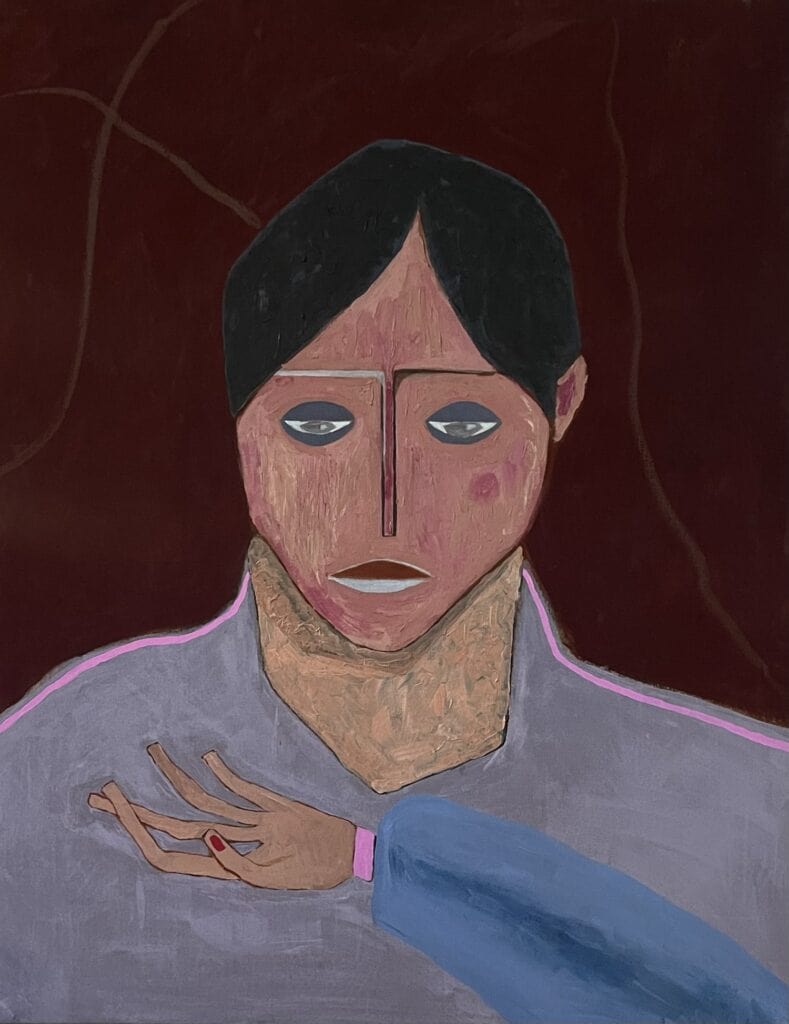
Origin: Toronto, Canada
Currently Exhibiting in: New York City
Website: casacasale.com
Bio:
Emma Casale is a Canadian oil and acrylic painter based in New York City, whose work explores the fragility of memory, identity, and transformation. Her paintings capture what lingers beneath the surface—the emotions, sensations, and quiet moments of dissonance that shape human experience. Drawing on muted, earthy palettes and raw, textured surfaces, Casale embraces imperfection and layers as part of her storytelling, allowing figures to emerge and fade like half-remembered dreams.
Casale’s work is deeply personal, reflecting themes of solitude and shifting identity. Her process combines the immediacy of acrylics with the depth of oils, resulting in works that feel lived-in, with layers of time, memory, and experience embedded into their surfaces. Previously exhibited in Toronto and Quebec, Casale’s art often defies clear narrative, offering instead a contemplative space for interpretation. With this exhibition marking her New York debut, she shares a visual exploration of loss, resilience, and transformation.
Featured Artwork at Bushwick Gallery
The Gift
- Year of Creation: 2023
- Medium: Acrylic and oil stick on canvas
- Dimensions: 42 x 33 inches
- Price: $2,000 USD
Description:
The Gift is a meditation on the quiet unraveling of identity. The fractured, partially obscured face at the heart of the painting reflects the moment when one’s sense of self begins to shift—whether through time, relationships, or personal loss. Casale’s layered, peeling textures mimic the process of shedding and revealing, as if parts of the subject are being stripped away to expose something raw and unguarded beneath the surface.
The muted tones, soft forms, and ghostly overlays create an atmosphere of tension and reflection. The outstretched hand, suspended between grasping and offering, underscores the ambiguity of this transformation. Is it a moment of surrender, or of reclaiming what was lost? Through this ambiguity, The Gift leaves room for viewers to confront their own moments of change and introspection.

Exhibition Information
Exhibition Title: Love and Heartbreak: A Duality
Opening Reception: Thursday, February 13 / 6PM-8PM
Exhibition Dates: February 13 – February 20
Theme: Love and Heartbreak: A Duality delves into the full spectrum of human relationships, from connection to separation. Casale’s The Gift perfectly embodies this theme through its portrayal of identity unraveling and transformation. The painting captures the emotional aftermath of loss—the point where something has ended, but the process of rebuilding has only just begun. Casale’s textured layers invite contemplation, reminding viewers of the beauty and complexity found in change.
Guided audio experience
For accessibility, the full video transcript is provided below for those who prefer to read or are unable to listen.
“There are moments in life when you no longer recognize yourself. When the face in the mirror feels like a memory, when the edges of identity begin to blur. The Gift by Emma Casale captures that quiet unraveling—the space between who we were, who we are, and who we might become.”
“The figure is whole, yet fractured. Their gaze is distant, almost vacant. Features—divided, softened, dissolving into the muted background. The rough, layered brushstrokes suggest something unfinished, something shifting beneath the surface. A self in transition. A self in question.”
“And then, there is the hand. Suspended. Reaching. Offering. But what is being given? What is being taken away? The gesture is ambiguous, caught between surrender and reclamation. Perhaps love itself is like this—an exchange that changes us, a transformation that leaves us both fuller and emptier than before.”
“Casale’s work speaks to memory, identity, and the fragile nature of selfhood. The dark, earthy palette feels lived-in, worn like an old photograph. Soft pinks and blues tracing the edges of the figure—faint reminders of warmth, of something slipping away but not yet lost.”
“What have you given in love? What have you lost? And in that loss, what part of yourself remains?”